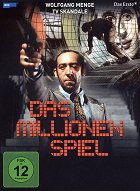
Directed by:
Tom ToelleScreenplay:
Wolfgang MengeCinematography:
Jan KališComposer:
Irmin SchmidtCast:
Dieter Hallervorden, Suzanne Roquette, Ralf Gregan, Elisabeth Wiedemann, Dieter Thomas Heck, Peter Schulze-Rohr, Friedrich Schütter, Gisela Marx (more)Plots(1)
A prophecy from 1970. Long before the existence of modern reality shows and devaluation of TV programs into an unashamed hunt for higher ratings, someone came with a felicitous prediction and turned it into a highly disturbing, stylistically refined documental fiction. (Summer Film School)
Reviews (1)
The Millions Game is further proof that the overused “quality TV” formula, though an outstanding marketing construct that succeeded in foisting itself on both viewers and critics, is a malicious tool for diverting attention away from the history of television production. The term implicitly expresses that television has become something ambitious or even pioneering only in the new millennium and that, in terms of quality, it had previously lagged behind cinema, which it caught up with in the 2000s and subsequently surpassed (as the PR departments of broadcasters and streaming services try to tell us). In cooperation with screenwriter Wolfgang Meng, Tom Toelle, one of a number of ambitious filmmakers who purposefully worked with the formats and possibilities of the small-screen medium, transformed Robert Sheckley’s book into an iconoclastic provocation that still raises a lot of questions that television would prefer not to ask, as they undermine its very nature as fiction passed off as reality. The Millions Game was made several years before television began to be reflected in mainstream cinema in films like Network (1976) and The China Syndrome (1979), but it also paralleled the iconoclastic work of Peter Watkins, though before his peak experiment Punishment Park (1971), not to mention The Running Man (1987) and the book on which it was based, to which The Millions Game is most frequently compared. The genius of Toelle’s experiment is shown not only in the way it fits into the mould of ordinary television by jumping from the format of news reporting to in-studio variety show and hyper-aestheticised commercials, but also in its use of the genre conventions of thrillers and subversion of those conventions through alternating perspectives and glimpses behind the scenes. Among other things, the subversive nature of this television project consists in the fact that it surreptitiously presents fragmentation, randomness and the artificial creation of tension as essential features of television entertainment. Furthermore, whereas Stephen King and the adaptation of his book toothlessly showed a dystopian future in which television entertainment is one of the by-products or parallel instruments of control, Toelle and his collaborators saw the reality-show format itself as a future dystopia. And now we know they were right.
()